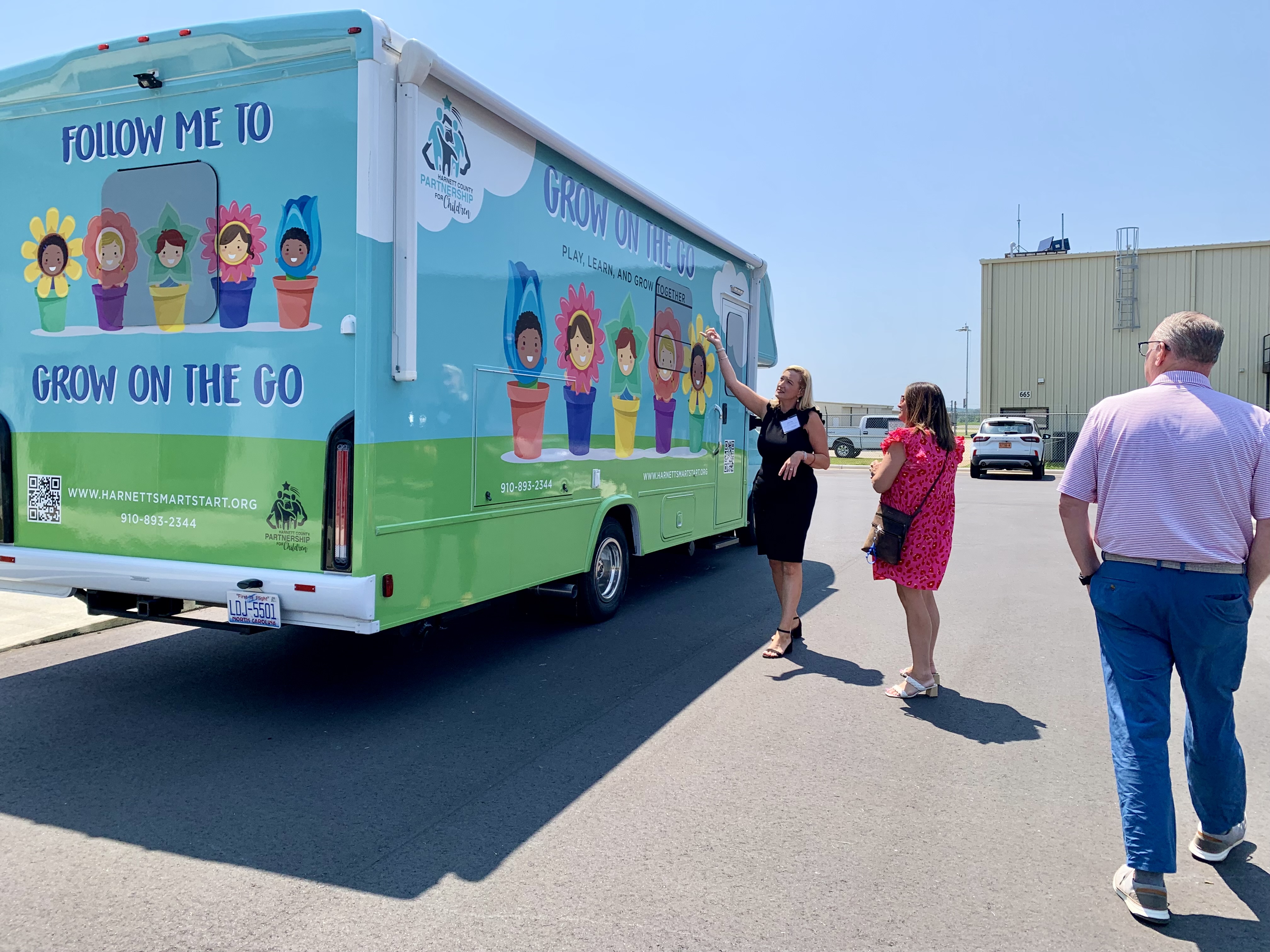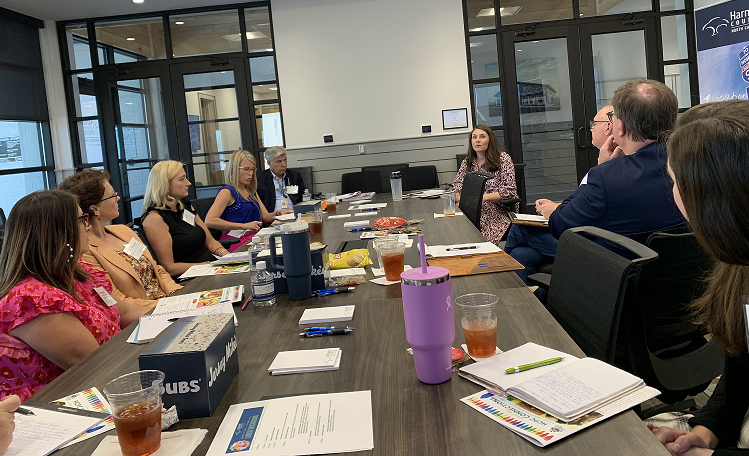Harnett County Economic Development Hosts Discussion on Child Care and its Impact on the Workforce
Friday, August 30, 2024
Harnett County Economic Development, in partnership with the North Carolina Department of Commerce and the Harnett County Partnership for Children, hosted a Workforce Trends Discussion on child care on August 27 at the Harnett Regional Jetport in Erwin.
The event focused on convening Harnett County’s largest employers across manufacturing, government, education, and healthcare sectors to discuss the child care crisis. The objective was to explore how this issue may affect the workforce in Harnett County, with local and state partners available to provide resources and engagement opportunities.
This blog recaps the event, including an overview of the local and state resources provided by our experts on child care.
Addressing Child Care Challenges in Harnett County
The reality is that Harnett County’s rapidly growing population is outpacing the availability of child care. Harnett is the 23rd largest county in North Carolina, with a population of approximately 142,000. The County is experiencing continuous growth, fueled by neighboring counties, with no signs of slowing.
Tara Fish, Executive Director of the Harnett County Partnership for Children, addressed the "state of child care" at the local level.
“Only 20% of children in Harnett County ages birth to five are currently in child care,” said Tara Fish, Executive Director of the Harnett County Partnership for Children. “That means 80% of children in Harnett County are not getting the important social and emotional development that is so important in these early years.”

The Harnett County Partnership for Children focuses on funding and implementing programs that prepare children from birth to age five for school and life success. Over the past five years, the organization has expanded its reach and impact, offering various services such as playgroups, health activities, NC Pre-K, and parent support groups. They also support early childhood professionals in the community, ensuring that children receive quality education during these critical years.
Fish and her team have been working to bridge the access to child care gaps by providing resources to the Harnett County community. One of the latest initiatives is “Grow on the Go” Mobile Playgroups. The new mobile play unit, affectionately named “Winnie the Winnebago,” offers play and learning opportunities for Harnett County families with children from birth to age five. Starting in August 2024, you can find Winnie, along with Fish and her team, each month at "Pop Up & Play" events across the County.
Along with the opportunity for their children to socialize and play, caregivers are provided resources on different themes. For example, August’s theme, "From Yuck to Yum," provided caregivers with information and strategies to help children eat a balanced diet. Learning extends beyond the mobile unit for caregivers and children, with key takeaways including book recommendations from the team to help caregivers engage their children in enjoyable and educational activities.
The Harnett County Partnership for Children is eager to collaborate with Harnett County employers and link them with local resources to ensure the best possible investment in our youngest citizens.
For more information visit harnettsmartstart.org.
Child Care Resources and Engagement Opportunities in North Carolina
Samantha Cole, Child Care Business Liaison with the North Carolina Department of Commerce, provided an overview of state-level resources and engagement options available for employers and communities at the Workforce Trends discussion. In her opening remarks, Cole acknowledged the three major challenges in child care: inadequate pay for educators, high tuition costs, and a shortage of available spaces.
“North Carolina has been at or near the top of the rankings for best states in the country to do business for the past several years, but to stay competitive, we need to ensure workers have access to affordable, high-quality child care,” said Samantha Cole, Child Care Business Liaison at the NC Department of Commerce. “Better access to child care means more economic opportunity for North Carolinians, and it means employers have more talent to fill available jobs.”
Cole provided attendees with more information on the Family Forward NC initiative. This employer-led initiative promotes the adoption of research-based, family-friendly practices - both large and small - that boost workplace productivity, improve recruitment and retention, and support children’s healthy development.

Businesses can evaluate their practices for family-friendliness, prioritizing the well-being of both employees and their children while maintaining competitiveness. Some benefits for employees may include:
- Paid Leave & Family-Sustaining Pay
- Flexible Work and Scheduling
- Health Benefits and Flexible Spending Accounts
- Accommodations and Support
- Child Care
Child Care Tuition Cost Sharing
Child Care Tuition Cost Sharing is a benefit that helps make child care more affordable by subsidizing a portion of the tuition costs for workers. An example of this is the NC Tri-Share Program, currently in its second pilot year. This program creates a public-private partnership where employers, eligible employees, and the State of North Carolina cover an equal share of child care expenses. The initiative is a collaboration between the North Carolina Partnership for Children, Catapult Employers Association, and Smart Start Network Regional Hubs, offering valuable child care benefits to eligible employees.
On-Site Emergency Backup Child Care
On-Site Emergency Backup Child Care provides emergency child care services offered on site within an upfitted space to serve emergency care needs for workers whose primary child care arrangement is interrupted. Cole shared that offering on-site emergency backup child care comes with relatively low operational costs and directly addresses a specific child care challenge. This service reduces unplanned worker absences and significantly enhances talent recruitment and retention efforts.
Near Site/On-Site Child Care
This option involves establishing a new child care center either on-site or nearby by the employer. The center can be operated by the employer directly or managed through a third-party contract. Key benefits include:
- Increased Availability: Provides new child care slots, reducing waitlists and offering priority for employees.
- Proximity: Close access to children, which is particularly beneficial for nursing parents.
- Customization: Allows for tailored hours and shifts that align with employee needs.
- High Return on Investment: Enhances talent recruitment and retention
“We want employers and communities to understand there are many ways to help improve access to child care for workers, ranging from evaluating business practices for family-friendliness all the way up to considering on-site or near-site child care,” Cole said. “We’re here to help employers choose engagement options that fit their budgets and the needs of their workforces.”
Along with input from Harnett County employers, the event featured valuable insights from attendees representing the North Carolina Department of Commerce's economic development, workforce development, and business services teams.
Continuing the Child Care Conversation in Harnett County
The Harnett County Economic Development Team has been closely monitoring this issue and viewed this initial discussion as an opportunity to gain deeper insights into the challenges facing Harnett County employers. We aim to keep the conversation going by bringing together industry employees and subject matter experts who can offer innovative solutions to support both existing and future businesses and industries in the county.
To stay updated on Harnett County Economic Development and our ongoing work, please visit us online at harnettedc.org. To connect with Samantha Cole, NC Commerce’s Child Care Business Liaison, please email samantha.cole@commerce.nc.gov.


